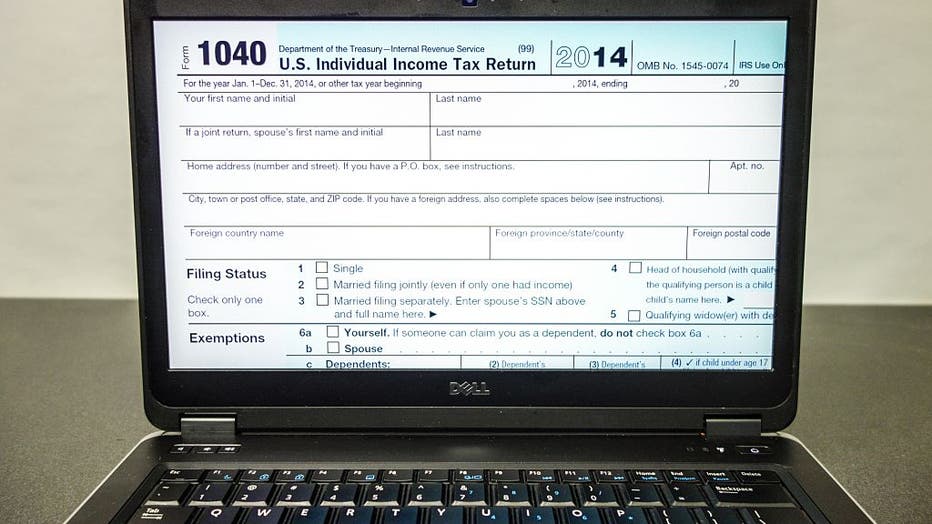Tax Day is May 17: Last-minute tips and what to know about filing late
WASHINGTON - Monday is the deadline for Americans to file their 2020 tax returns, or they risk facing a financial penalty.
The Internal Revenue Service delayed the traditional deadline from April 15 until May 17, allowing an extra month for taxpayers and the agency to prepare their filings amid a number of changes brought on by the coronavirus pandemic.
The decision to extend the deadline came after an intense year for the chronically underfunded IRS. The pandemic hit in the middle of last year’s tax filing season, setting the agency back in terms of processing. The IRS has also been a key player in doling out government relief payments, helping to send out the third round of stimulus checks this spring in the midst of tax season.
The extension also gave the IRS time to issue guidance on recent tax law changes. The American Rescue Plan excludes the first $10,200 of unemployment benefits from federal taxes for those making less than $150,000.

A view of an IRS 1040 Tax Form on a computer screen being prepared for an electronic filing. (Photo credit: Getty Images)
The IRS had received more than 126 million returns and processed nearly 116 million of those returns as of May 7, online data shows. The agency has also issued roughly 85 million refunds, down 3.2% from the same date in 2020.
For those who have not yet filed their 2020 tax returns, here’s what you need to know:
File tax returns online, if possible
As the IRS works through a backlog of paper returns that built up in 2019 during the pandemic, the agency suggests filing tax returns online and said it’s the fastest way to receive a refund, according to its website.
In 2018, about 90% of taxpayers filed their returns online and the agency said about 9 out of 10 refunds were issued in less than 21 days.
"E-file meets strict security guidelines. It uses modern encryption technology to protect tax returns," the agency says. "The IRS continues to work with states and tax industry leaders to protect tax returns from identity theft refund fraud. This effort has helped put strong safeguards in place to make tax filing a safe and secure option."
Taxpayers can request an extension
Those who need more time beyond May 17 can request an extension until October 15. Individual tax filers can use the online "Free File" tool to electronically request an automatic tax-filing extension. The form requires an estimate of tax liability.
However, those who owe taxes to the federal government must also pay any amount due on May 17. The IRS offers several ways to pay, in addition to payment plans for those who can’t pay the amount in full.
Some may qualify for penalty relief
Some taxpayers qualify to have their late-filing or late-payment penalties reduced or eliminated, according to the IRS. The agency says this is done on a case-by-case basis, based on reasonable cause.
As another option, if a taxpayer has filed and paid on time during the past three years, the agency can typically provide relief under the First Time Abatement program. Visit IRS.gov/penaltyrelief for more information.
Refunds could be delayed
The agency’s internal watchdog, called the Taxpayer Advocate Service, said the agency is holding more than 29 million tax returns for manual processing.
"As one would expect, IRS employees are stretched thin working through the manual processing of these returns," the TAS wrote in a late April blog post. "So if a taxpayer’s return is pulled for manual processing, there will be delays."
The watchdog said holding returns have resulted in delayed refunds. As of April 9, more than 8 million individual returns (Form 1040 or 1040-SR) were in "suspense status" awaiting review and manual processing.
"For context, during a normal filing season when the (Error Resolution System) unit is fully operational, it does not suspend returns, as it is able to review and process them as they come in," the TAS said.
According to FOX Business, an IRS employee reviews them to ensure the taxpayer received the fully promised stimulus check money. Agency officials are also calculating the earned income tax credit and child tax credit — which were both expanded for lower-income Americans in President Joe Biden's $1.9 trillion COVID-19 relief package.
In addition to the 8 million returns in "suspense" status, some 5.3 million 2019 or 2020 paper returns are awaiting manual processing, and 4.7 million returns have processing errors or fraud identification issues that require a response from the taxpayer. The agency also withheld 11 million business and other returns for manual processing, according to the watchdog.
Taxpayers can check the status of their refund online or by using the IRS2Go mobile app.
This story was reported from Cincinnati. The Associated Press contributed.

